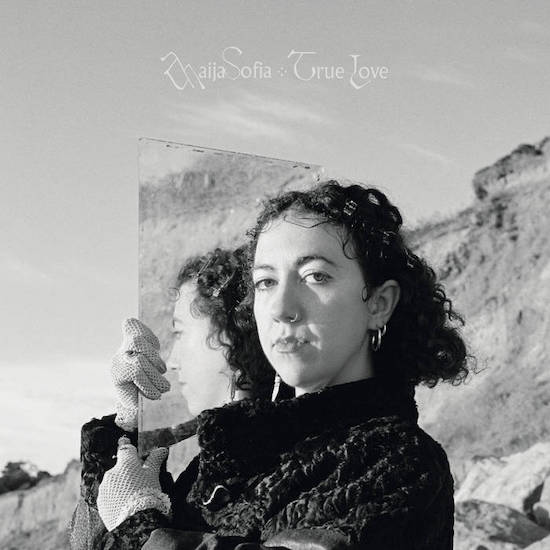The new album from Maija Sofia, following her 2019 debut Bath Time, already looks like a 2020s classic. Sofia is a singer and songwriter from Galway with an uncanny ability to blend nagging melodies with lyrics that catch at your throat. Bath Time included songs about women who have been discarded, abused and wronged, including Edie Sedgwick, Jean Rhys and 19th-century murder victim Bridget Cleary, whose stories were conjured in gorgeous, eerie ways. True Love includes more personal stories which seem to be about Sofia herself – her experiences of places, relationships and social demands – alongside historical reference points. The result bridges folk and experimental pop across ten extraordinarily strong songs.
Sofia’s voice is light and beautiful, but she has a powerful extra register that adds a rawness and a catch that leave the listener in no doubt about her investment in what she sings. It is hard to pick a highlight on an album that doesn’t put a foot wrong, but ‘Telling the Bees’ is a good place to start. There’s a haunted fairground waltz, with organ, harp and piano, and a swirling vocal that sounds a bit like Cate Le Bon, then Aldous Harding, then Joanna Newsom. But most of all it sounds like Sofia, who makes her songs entirely her own.
The lyrics bind together the story of medieval Italian saint Rita of Cascia, who converted her abusive husband through her patience, and the folklore tradition in which bees must be informed of births, deaths and significant events. Other tracks also conjure mysterious, esoteric history in startlingly current ways. ‘Saint Sebastian’ sees the titular character through the eyes of a lover, who says “Life’s so boring when you’re sober and not in love.” With its unnervingly tense cello and harp arrangement, it would slot smoothly onto Kate Bush’s Never for Ever album, which is high praise, nor is it the only one. ‘Four Winters’ has a tune that is impossible to forget, and it tells a story of abuse with strange and mythic overtones: “I gave him four winters / four beautiful bruises and splinters”. The lyrics feature clots in menstrual blood and birch sap licked from fingers, images that invest ordinary substances with intense meaning.
True Love was made in retreat from the city in what Sofia describes as a “300-year old haunted former yacht club” on the Cork coast, an appropriate location for conjuring and story-making. Some of what brought her there seems to come out through songs such as ‘Weird Knight’, which is about drinking and break-ups in Dublin. Its candid, apparently biographical story-telling recalls James Yorkston, as does the low-key acoustic guitar and string arrangement. ‘Love is in the House’ could be part of the same story, a couple who can’t stay together or apart. It has a stormy piano and a yearning chorus, which includes the angry/sad line “I still taste him in my mouth”, belied by the beauty of the music.
Sofia’s songs are the kind that come to you in the shower months later out of nowhere, having lodged themselves in the unconsciousness. True Love is about real people, alive and dead, and the power of objects, substances, time and place. It is the work of someone with an enviable talent, and it deserves a lot of love.


